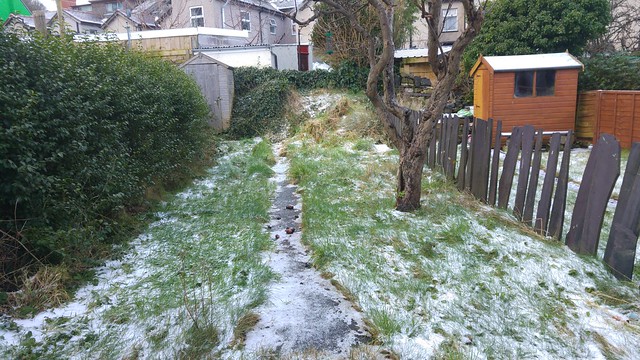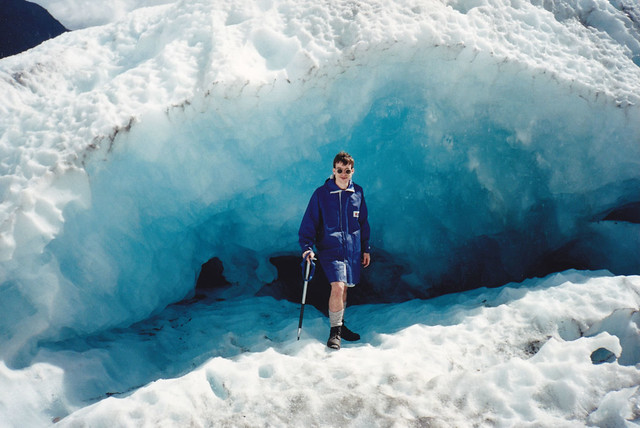Words for frost, ice, cold and related words in Celtic languages.
Words marked with a * are reconstructions.
| Proto-Celtic | *ɸreswos = frost |
|---|---|
| Old Irish (Goídelc) | réúd [r͈ʲeːu̯ð] = frost |
| Middle Irish (Gaoidhealg) | reód = frost |
| Irish (Gaeilge) | reo [ɾˠoː / ɾˠɔː] = frost reodóg = icicle reoigh = to freeze, congeal, solidify reoiteach = frosty, chilling reoiteacht = frostiness reoiteog, uachtar reoite = ice cream reomhar = frigid |
| Scottish Gaelic (Gàidhlig) | reòth [r̪ˠɔː] = frost, freeze, become frozen, congeal reòite [r̪ˠɔːdʲə] = frozen, frosty, icy reòthtach [r̪ˠɔːhdəx] = freezing, frosty reòthadh = freeze reòthadair [r̪ˠɔ.ədɪrʲ] = deep-freeze, freezer stob reòta, caisean-reòta, boidean-reòthaidh = icicle |
| Manx (Gaelg) | rio = frost, freezing, ice riojey = to freeze, ice up rioeeagh = freezing, frosty rioeeaght = frostiness rioghar, bwoid rioee, kibbin rioee = icicle riojag, key riojey, key riojit = ice-cream rio-stroo, awin rioee = glacier |
| Middle Welsh (Kymraec) | rew, reo, rev = frost rewlyt, rewlyd, rewllid = icy, freezing, frozen |
| Welsh (Cymraeg) | rhew [r̥eːu̯ / r̥ɛu̯] = (hoar-) frost, ice rhewaidd = freezing, frosty, icy rhewedig = frozen, icy, extremely cold rhewi = to freeze, preserve; anaesthetize, make numb rhewiadur = refrigerator rhewin = frosty weather rhewllyd, rhewlyd = icy, freezing, frozen, very cold, frigid rhew bargod = icicle rhew du = black ice gwŷn rhew = frost-bite rhedlif rhew = glacier |
| Old Cornish | reu = ice, frost |
| Middle Cornish (Cernewec) | rew, reu = frost, ice |
| Cornish (Kernewek) | rew = ice, frost rewer = freezer rewi = to freeze rewys = frozen downrewi = deep-freeze, freezer dehen rew = ice cream furvell rew = ice tray kub rew = ice cube skes rew = ice skate |
| Middle Breton (Brezonec) | reau, reo, réau, rëu = frost, frozen |
| Breton (Brezhoneg) | rev = frost, freezing, freeze rev du = black ice rev noz = night frost |
Etymology: from the Proto-Indo-European *prews- (to freeze, frost), which is also the root of the word frost in English [source].
| Proto-Celtic | *yegis = ice |
|---|---|
| Old Irish (Goídelc) | aigred = ice aigretta = icy, frozen |
| Middle Irish (Gaoidhealg) | aig = ice aigide = icy |
| Irish (Gaeilge) | oighear [əiɾʲ] = ice oighear dubh = black ice oighreach = glacial leac oighir = (sheet of) ice |
| Scottish Gaelic (Gàidhlig) | eigh [ej] = ice eigh-bheinn = iceberg eigh-shruth = glacier leac-eighe = ice-floe linn-eighe = ice age pac-eigh = pack ice taigh-eighe = ice house |
| Proto-Brythonic | *jaɣ = ice |
| Middle Welsh (Kymraec) | ia, ya = ice, frost |
| Welsh (Cymraeg) | iâ [jaː] = ice, (hoar-) frost iaaidd = glacical, icy iaënnol = glacical, icy iaeth, iaaeth = iciness, frost, cold, severe winter weather ialyd = icy, freezing, very cold iaog = icy, freezing, frozen iain = very cold, freezing, icy |
| Old Cornish | iein = ice |
| Middle Cornish (Cernewec) | iein, iên, yein, yeyn, yên = cold (as ice), frigid ieinder, iender, yender, yeinder = frigidity, coolness |
| Cornish (Kernewek) | yey = ice yeyn = cold yeynder = cold yeynell, yeyner = fridge yeynhe = to chill, become cold |
| Middle Breton (Brezoneg) | yen = cold |
| Breton (Brezhoneg) | yen = cold yenaat = to cool down, relax yenadur = coolness, cooling, chill yenañ = to cool, refrigerate, detach yender = cold, coolness |
Etymology from the Proto-Indo-European *h₁yeg- (ice, frost), which is also the root of the English word icicle [source].
| Proto-Celtic | *ougros = cold |
|---|---|
| Gaulish | Ogronnios = personal name |
| Old Irish (Goídelc) | úar [uːa̯rʲ] = cold úacht = cold, coldness |
| Middle Irish (Gaoidhealg) | úar = cold, cool. refreshing, unfriendly ind(ḟ)úar = very cold, chilly, cool, refreshing, pleasing, entertaining úacht, ócht, ocht = cold, coldness, numbness |
| Irish (Gaeilge) | fuar [fˠuəɾˠ] = cold, apathetic, raw, uncooked fuaraigh = to cool, make cold, chill, relieve, pass (away) fuaráil = coolness, indifference, reserve fuaraíocht = coldness, chilliness fuarálach = cold, indifferent, reserved fuacht = cold, chill, apathy fuachtán = chilblain |
| Scottish Gaelic (Gàidhlig) | fuar [fuər] = cold fuarachd [fuərəxg] = coldness, chilliness, chilblain, mildew, dampness fuarachdainn [fuərəxgɪn̪ʲ] = cooling, easing, relieving fuaradair [fuərədɪrʲ] = fridge, refrigerator fuaraichte [fuərɪçdʲə] = cooled, refrigerated, eased, relieved fuarail [fuəral] = chilly, chilling fuaralachd [fuərəl̪ˠəxg] = coldness, frigidity |
| Manx (Gaelg) | feayr = chill, cold, cool, frigid, frosty, ice, distant (of person) feayght = chill, cold, exposure feayraghey = chill, cool, refrigerate, alienation feayraght = chill, cold, coldness feayrit = chilled, cooled, refrigerated |
| Middle Welsh (Kymraec) | oir, oer = cold, cool oerai, oeri = to make/become/grow cold or cool oyrder = cold(ness), cool(ness), chill, indifference, apathy oered = coldness, chill oervel, oeruel = cold(ness), chill |
| Welsh (Cymraeg) | oer [jaː] = cold, cool, sad, dejected, miserable, coldness, child, cold vegetables, fruit and salad oeraf, oeri = to make/become/grow cold or cool, lose zeal, become depressed oeraidd = rater cold, coolish, coldish, chilly, unenthusiastic, apathetic, indifferent oerder = cold(ness), cool(ness), chill, indifference, apathy oeredd = coldness, chill oerfa = cool place, shade oerfel = cold(ness), chill oergell = refrigerator, freezer, cold cell |
| Middle Cornish (Cernewec) | oir = cold, frigid |
| Cornish (Kernewek) | oor = bitterly cold, glacial, icy |
Etymology from the Proto-Indo-European *h₃ewǵ- (cold), which is also the root of the Lithuanian word aušti (cold) [source].
Another word for ice in Breton is skorn – etymology unknown.
Sources: Wiktionary, Am Faclair Beag, Online Manx Dictionary, Teanglann.ie, eDIL – Electronic Dictionary of the Irish Language, In Dúil Bélrai English – Old Irish glossary, Geiriadur Prifysgol Cymru, Gerlyver Kernewek, Gerlyvyr Cernewec, Lexicon Cornu-britannicum: A Dictionary of the Ancient Celtic Language of Cornwall, Dictionaire Favereau, TermOfis, Le dictionnaire diachronique du breton, Geriafurch, English – ProtoCeltic WordList (PDF), Etymological Dictionary Of Proto Celtic




